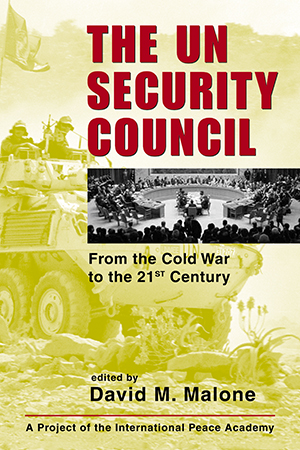David M. Malone, editor
The nature and scope of UN Security Council decisions—significantly changed in the post-Cold War era—have enormous implications for the conduct of foreign policy.
The United Nations Security Council offers a comprehensive view of the council both internally and as a key player in world politics.
Focusing on the evolution of the council's treatment of key issues, the authors discuss new concerns that must be accommodated in the decisionmaking process, the challenges of enforcement, and shifting personal and institutional factors. Case studies complement the rich thematic chapters. The book sheds much-needed light on the central events and trends of the past decade and their critical importance for the future role of the council and the UN in the sphere of international security.
David M. Malone, under-secretary-general of the United Nations, serves as rector of the United Nations University. His most recent publication is The International Struggle over Iraq: Politics in the UN Security Council 1998-2005.
"A richly informative volume on the evolving role of the Council."—Chadwick Alger,
International Studies Review
"[A] well-planned and fascinating book.... Well worth reading."—Sally Morphet, International Affairs
"Encyclopedic in scope and authoritative in analysis.... everyone who cares about the future role of the United Nations and the international rule of law will want to read this book."—John G. Ruggie, Harvard University
"It is hard to imagine a more timely volume. This is a must read for any serious student or scholar of the United Nations, or indeed anyone pondering the relative success or failure of the international community's grand experiment in regulating the use of force by law."—Anne-Marie Slaughter, Woodrow Wilson School, Princeton University
"A wide-ranging and highly topical study of that most mysterious and misunderstood international body, the UN Security Council. From the first Gulf War to the second, via the successes of El Salvador and Mozambique and the failures of Bosnia, Somalia, and Rwanda, the authors examine the most eventful years in the UN's history."—David Hannay, British Ambassador to the UN, 1990-1995
"David Malone has assembled an extraordinarily talented group of authors.... This is a key work for any who want to be informed about the United Nations."—Joseph S. Nye, Kennedy School, Harvard University
"At a time when there is vigorous debate both within and outside the UN Security Council about its relevance for world affairs, this book is a necessary grounding for our thinking."—I. William Zartman, SAIS, John Hopkins University








